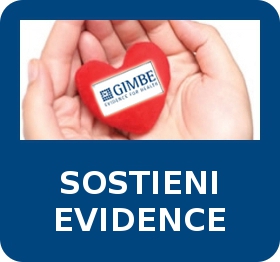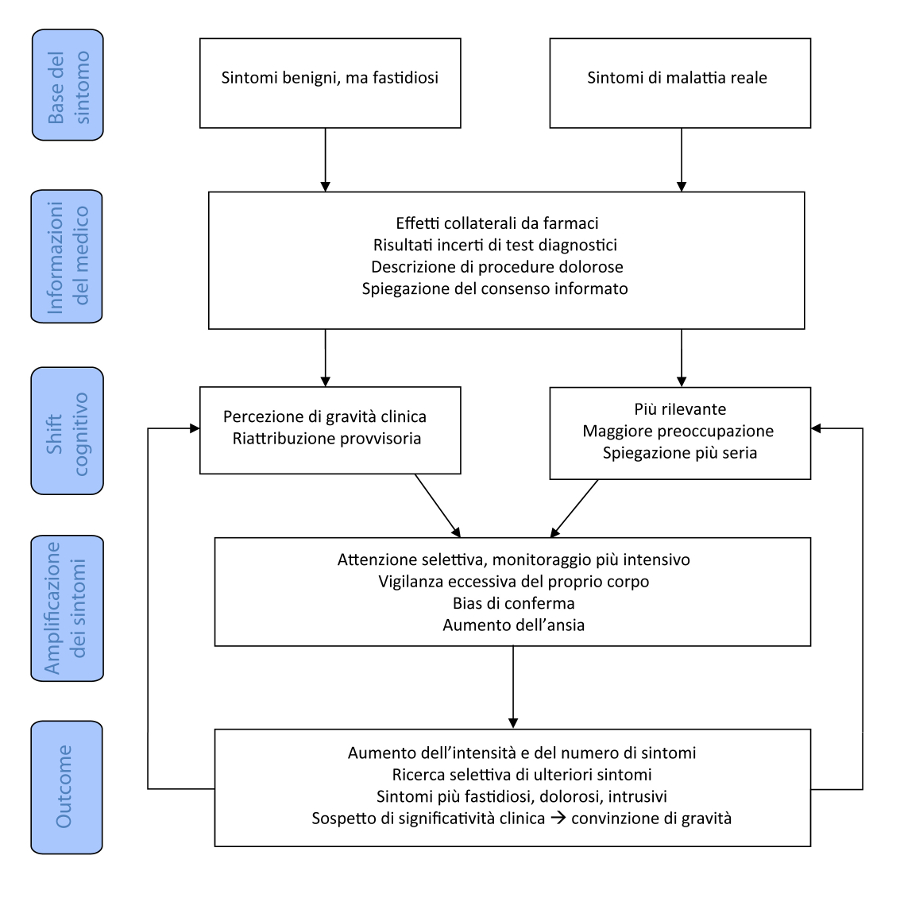Se è indubbio che la comunicazione tra medico e paziente è alla base di una relazione ottimale finalizzata a decisioni condivise, lo psichiatra Artur Barsky ha recentemente analizzato gli effetti collaterali che le parole dei medici possono avere sulla salute dei pazienti (1). Infatti, alcune informazioni non solo possono amplificare inconsapevolmente la sintomatologia dei pazienti, ma anche accentuare gli stress somatici, dimostrando il potenziale effetto iatrogeno delle parole del medico, che va a sommarsi agli effetti collaterali di farmaci, test diagnostici ed altri interventi sanitari. Di questi “effetti collaterali” i medici dovrebbero essere pienamente consapevoli per assistere al meglio i propri pazienti.
Sintomi e malattie non hanno un rapporto 1:1 fisso e invariabile: infatti, accanto sintomi che possono presentarsi in assenza di malattie reali, esistono patologie che rimangono asintomatiche anche in fase avanzata. Inoltre, esiste una notevole variabilità di sintomi dovuti alla stessa malattia o processo fisiopatologico, sia tra diverse persone, sia nella stesso paziente. Un mediatore di questa variabilità tra sintomi e malattia è rappresentato da opinioni, convinzioni, idee e aspetti cognitivi che, pur non avendo la capacità di generare sintomi, possono amplificarli, perpetuarli ed esacerbarli, rendendoli più rilevanti, nocivi, intrusivi e fastidiosi.
In numerosi ambiti, oggi le evidenze documentano il potenziale iatrogeno delle parole del medico: prescrizione di nuove terapie, spiegazione del modulo di consenso informato, presentazione di risultati incerti dei test diagnostico, preparazione dei pazienti a procedure dolorose.
Conoscere tutti gli effetti collaterali dei farmaci frequenti e non specifici (es. astenia, difficoltà di concentrazione, nausea, vertigini e cefalea) aumenta la frequenza con cui questi vengono avvertiti e riportati (2). In relazione alle modalità con cui vengono fornite le informazioni ai pazienti (colloquio con il medico vs consenso informato), i pazienti che vengono a conoscenza degli effetti avversi non specifici di ß-bloccanti, statine, contraccettivi orali a base di estrogeni e agenti per sintomi urinari ostruttivi riportano più frequentemente presunti effetti avversi rispetto ai pazienti non informati. Ad esempio, in uno studio su 76 pazienti ipertesi trattati con ß-bloccanti, la disfunzione erettile si è verificata nel 32% dei pazienti esplicitamente informati su questo effetto avverso rispetto al 13% di quelli non specificatamente informati (3).
L’effetto nocebo, ovvero il manifestarsi di effetti avversi al placebo, rappresenta la controprova che conoscere gli effetti collaterali aumenta l’incidenza di alcuni sintomi. Infatti i pazienti del gruppo placebo in un trial randomizzato controllato in doppio-cieco riportano effetti avversi di tipologia e frequenza simili a quelli del farmaco attivo su cui sono stati informati.
Anche fornire risultati di test diagnostici dal significato clinico incerto può determinare un peggioramento dei sintomi. Ad esempio, in uno studio randomizzato sulla lombalgia acuta, il gruppo di intervento (n= 210) è stato sottoposto a imaging della colonna vertebrale, mentre quello di controllo no (n = 211); in entrambi i gruppi è stato attuato un piano terapeutico conservativo. Nel primo gruppo a 3 mesi si sono verificati un aumento significativo del dolore, maggiori danni funzionali e più visite mediche (4). Peraltro i problemi conseguenti alla comunicazione di risultati di test poco chiari o di anormalità anatomiche di dubbia rilevanza clinica (“incidentalomi”) sono verosimilmente destinati ad aumentare parallelamente con l’evoluzione delle tecnologie diagnostiche.
Il dolore è particolarmente influenzato da convinzioni, opinioni e aspettative dei pazienti e il linguaggio utilizzato per descrivere e preparare i pazienti a procedure dolorose può influenzarne la percezione. In un trial randomizzato condotto su 140 partorienti sottoposte ad anestesia epidurale o spinale, le donne a cui era stato comunicato che l’iniezione intradermica dell’anestesia locale può essere percepita come una «puntura d’ape, caratterizzandosi come il momento peggiore della procedura» hanno riportato un dolore più intenso rispetto a quelle a cui era stato comunicato che «l’anestetico locale […] anestetizzerà l’area e ti sentirai più a tuo agio durante la procedura» (5).
L’amplificazione viscerosomatica esemplifica il meccanismo con cui l’informazione può condizionare la percezione dei sintomi. L’informazione del medico non genera sintomi somatici, ma piuttosto li amplifica, in particolare quelli che derivano da condizioni cliniche preesistenti o da stati fisiologici (es. ectopia, ipotensione ortostatica), disfunzioni benigne comuni (raucedine, gonfiore, crampi), disturbi transitori e autolimitanti (eruzioni cutanee, infezioni del tratto respiratorio superiore), eventi stressanti, limitato esercizio fisico, mancanza di sonno, eccessi alimentari. In questi casi, le informazioni fornite dal medico possono innescare un circolo vizioso di amplificazione dei sintomi (figura). Infatti, sapere che un sintomo può essere rilevante o attribuibile ad una condizione più severa genera preoccupazione nel paziente che inizia a monitorare e analizzare il sintomo in maniera sempre più accurata. Questo eccesso di attenzione lo amplifica, rendendolo più intenso, intrusivo, allarmante e doloroso (6,7). L’errata percezione di gravità innesca la ricerca selettiva di ulteriori sintomi per confermare il sospetto che qualcosa non vada, determinando un’accresciuta consapevolezza di altri sintomi diffusi, transitori o ambigui precedentemente ignorati, minimizzati o ritenuti insignificanti. L’emergenza di questi “nuovi” sintomi, a dispetto dei dati che non confermano la causa sospetta, viene percepita come elemento di ulteriore gravità. Inoltre, il ciclo di amplificazione viene ulteriormente alimentato dall’ansia: aumentare preoccupazione e attenzione per il significato clinico di un sintomo e il suo apparente aggravamento lo rende più minaccioso e nefasto.
Particolare attenzione alle informazioni da trasmettere e alle modalità con cui farlo può minimizzare l’accidentale esacerbazione di sintomi eccessivi, esagerati e ingiustificatamente fastidiosi. Come primo step terapeutico occorre analizzare le idee del paziente sui sintomi: quale è la causa sospetta dei sintomi e il suo presunto significato? Quale è l’evoluzione attesa? Quali sono gli aspetti più preoccupanti? Le risposte a queste domande possono guidare una discussione più realistica e rassicurante sulle specifiche preoccupazioni del paziente.
Anche spiegare il processo dell’amplificazione viscerosomatica può essere efficace: sapere che l’interpretazione delle informazioni mediche può esacerbare e perpetuare i sintomi e conoscere i processi di errata attribuzione, attenzione selettiva, analisi minuziosa del proprio corpo e ansia secondaria può fornire ai pazienti una rassicurante spiegazione del loro malessere. La garanzia che i sintomi, anche se fastidiosi, non sono clinicamente pericolosi, li rende meno invasivi e più tollerabili. L’effetto nocebo fornisce un utile esempio oggettivo di quanto le convinzioni possano amplificare i sintomi. Questo tipo di discussione aiuta inoltre a enfatizzare e incoraggiare strategie adattative per migliorare la tolleranza al dolore. Potrebbe essere utile identificare i pazienti a rischio di effetti avversi non specifici sproporzionati o indebiti, così da spiegare loro in anticipo il processo di amplificazione. A tal fine può essere utilizzato lo strumento Perceived Sensitivity to Medicines (8), questionario di autovalutazione a 5 item di provata validità e affidabilità.
Oltre a valutare le idee del paziente e a spiegare il processo di amplificazione, i medici devono prestare molta attenzione alla scelta dei termini. Ad esempio, durante la discussione di procedure potenzialmente dolorose, i medici possono enfatizzare cosa sarà fatto per alleviare il dolore (es. semplici tecniche di rilassamento), utilizzare un linguaggio neutro per descrivere l’esperienza e fornire per quanto possibile al paziente maggiori opportunità di scelta e controllo dell’analgesia. Analogamente, le modalità comunicative sono importanti per spiegare gli effetti avversi non specifici dei farmaci: ad esempio è fondamentale concentrarsi sulla percentuale di pazienti che non hanno sperimentato gli effetti avversi elencati.
Anche nel processo di consenso informato, i medici devono sempre fornire informazioni complete e realistiche evitando relazioni di tipo paternalistico. Tuttavia, non sempre è facile bilanciare la necessità di una piena e completa informazione al paziente con il potenziale iatrogeno di alcune informazioni. Per raggiungere un compromesso eticamente accettabile tra i due imperativi, è stato proposto il “consenso informato contestualizzato” (9). Questo prevede di descrivere puntualmente tutti gli effetti avversi più gravi e clinicamente rilevanti invitando il paziente a riportarli; tuttavia, previo accordo con il paziente, i sintomi non specifici e/o poco rivelanti non vengono elencati in anticipo spiegandogli che altrimenti si presenterebbero con maggiore frequenza.
Sintomi insolitamente angoscianti possono indicare difficoltà nella relazione medico-paziente, concretizzando una modalità non conflittuale e meno esplicita di esprimere dubbi o preoccupazioni dei pazienti non in grado di parlarne apertamente o troppo imbarazzati per farlo. I sintomi possono quindi diventare una modalità di comunicazione occulta, non verbale di ansia per il dolore, di diffidenza sui trattamenti, di preoccupazioni sul significato del risultato di un test diagnostico o sulla competenza del medico (2).
L’informazione al paziente è dunque un importante mediatore della variabilità nella relazione fra malattie e sintomi. Effetti avversi non specifici ai farmaci, dolore eccessivo conseguente a procedure e sintomi esacerbati da risultati di test diagnostici di incerto significato clinico sono determinati da meccanismi patogenetici simili e rispondono alle stesse strategie terapeutiche.




